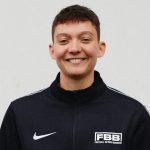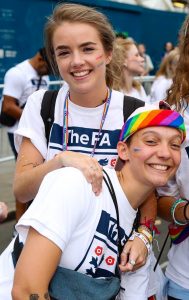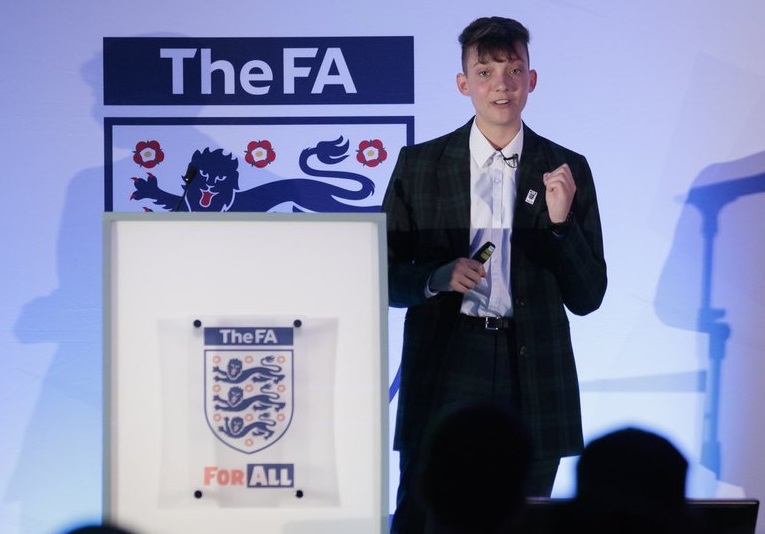‘Be your best self!’: Roya Mehdizadeh-Valoujerdy Q&A

She’s been nominated in the Young Inspiration category at the Sunday Times Sportswomen of the Year Awards – meet the FA National Youth Council chair…
By Jon Holmes

Valoujerdy
“Football is at the heart of everything I do, so it’s important that it feels inclusive. For me, that is achieved by creating LGBT+ role models.”
It’s quotes like this that have helped make Roya Mehdizadeh-Valoujerdy an Inspiration – and that’s official!
Through her work with the FA National Youth Council, as a coach, and in other football roles, ‘RMV’ has been Representing our community; Motivating others; and Visible as her authentic self. Now she’s up for a prestigious award…
Recently, we profiled cycling’s Imogen Callaway, who’s nominated for the Influencer Award at the 2020 Sunday Times Sportswomen of the Year Awards. Roya is also a deserved SWOTY nominee – in the Young Inspiration category (vote for her here!) – and we’ve caught up with her for a Q&A to find out more about her football journey.

Through speaking at FA events, sharing her story with Telegraph Women’s Sport, and helping others out on the pitch or in workshops, much of Roya’s life revolves around the beautiful game – and that’s the way she likes it. Having completed a Sports Development degree at Leeds Beckett University, she’s now working with Leeds United and Football Beyond Borders.
What inspires Roya? Why is LGBT+ inclusion so important to her? And what are her ambitions? We ask the questions!
Hi Roya – congratulations on your SWOTY Nomination! Tell us what it means to you to be recognised nationally as a Young Inspiration.
It’s a massive, massive, massive deal to be even nominated for this award. There are so many amazing young people out there changing the world and I just feel extremely pleased and honoured to be in a role where I can support these amazing young people and try to be a voice for them and for positive change!
What have been the most satisfying experiences of your football coaching career to date? Any examples you can share with us?
This is a tough one! I have worked with such a variety of different groups and loved every opportunity. One of my favourite groups was a disability football session I delivered when I was 16. I grew the group from four to 15 and created a small community of these players and their families, which they were extremely grateful for. Every session was fun with no pressure and that was an amazing feeling.
Now I’m coaching at Leeds United RTC (Regional Talent Club), which is a fantastic opportunity to work with young female players where I can hopefully be a positive role model and support them in achieving their dreams – it’s another great feeling.
It sounds like you’ve really thrived through being part of the FA National Youth Council. What are your responsibilities there?
Yeah, so the FANYC is a group of 10 young people with the vision of ensuring all young people have meaningful opportunities to develop themselves and positively impact the football community.
I joined the team as a Regional Engagement Officer; last season, I was Vice-Chair; and this season I have taken on the role of Chair. This is a huge responsibility, as I sit on the FA Council and committees to represent the voice of all children and young people.
My role gives me the ability to constantly seek out opportunities for young people to be involved in and actually showcase the power and value young people bring to football.

Let’s talk LGBTQ! We loved your comment piece with Emily for Telegraph Women’s Sport back in February. You wrote about the cultural struggle you experienced while coming out. What would have had a positive influence on you back then, and helped you?
Good question! I guess if we look at what actually did help me come out, it was being around other young LGBTQ+ people.
I think seeing more LGBTQ+ role models or having more in my life would have really helped me in understanding myself and coming out. That’s why I strive so hard now to always be that person for others, in any settings I’m in – being your best self allows others to do the same.
We know that truly inclusive football spaces are important for people who are LGBTQ+ to build their confidence. What signals or messaging do you find is most effective, and how can coaches deliver them in a way that doesn’t make people feel uncomfortable or under pressure?
I think it goes back to what I just said about having role models and people being able to be their best selves. Alongside that, I think smaller things such as supporting the Rainbow Laces campaign and other campaigns shows you are or are trying to be an inclusive club.
I remember listening to you speak up for young people at the FA’s annual LGBT History Month reception in February – it was really inspiring. It feels like there’s often a lot of pressure on youth these days when they’re navigating sexual orientation and gender identity. Through your visibility and conversations you’ve had, have you been able to help someone through this?
I’m not too sure that I could specifically say I have helped someone – that would be down to them. People always comment on my ability and confidence in being so authentically myself. This is always a huge compliment as it’s what I strive to do and people have told me this has supported them in feeling comfortable in being their whole self too.
You’re now part of the Football Beyond Borders team – we love their work! I know our mutual friend, the fab Chris Paouros, has been in recently to deliver some LGBTQ training. Are you able to tell us a little about that session and why some extra education is important for everyone, even the fine folks at FBB?
Yeah, at FBB we want to support our young people in being their best selves. LGBTQ+ education is so important to this and as a team, we are always looking at ways we can learn and develop ourselves.
We know school can be a really challenging time for young people so we want to be equipped with the tools to best support our participants.
Your fellow SWOTY Young Inspiration nominees are all aged 12 to 17. At 22, you’re the veteran for once! What are your big ambitions now?
Haha, wow! I feel like I am getting old! My ambitions right now? That’s a tricky one. I love what I do and right now, my real ambitions are to best support the young people I work with, and ensure that young people are heard, included and integrated into all levels of football.
Finally, as we’re Sports Media LGBT+… you’ve now done a few bits of media here and there. What’s your take on how our industry is faring with including voices such as your own? Any advice for what we can do better?
The industry is certainly an interesting one. I think there’s some good bits out there – much like yourself and shout out to my good friend Fadumo Olow at Telegraph Women’s Sport, sharing some good stories.
We will all keep pushing for those mainstream media stories. I guess my advice would be to look beyond your networks and connect with organisations and groups doing good things and to not forget about young people – they have such incredible stories to tell!

Thanks so much to Roya for joining us for this Q&A! Follow her on Instagram and on Twitter at @roya_mehdizadeh.
Sports Media LGBT+ is a network, advocacy and consultancy group that is helping to build a community of LGBT+ people and allies in sport. Learn more about us on our About page; to get in touch, Contact Us here or drop an email to jon@sportsmedialgbt.com – we welcome your correspondence.
Further reading…
Greg Clarke’s gone, but FA’s LGBT+ inclusion work will continue


